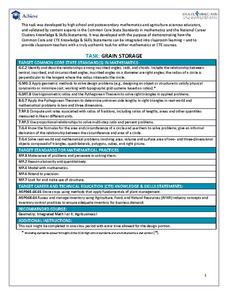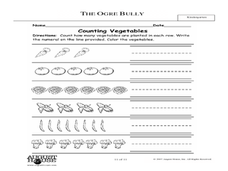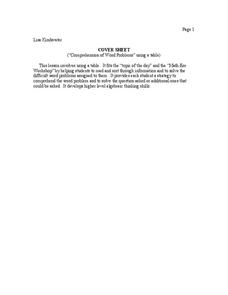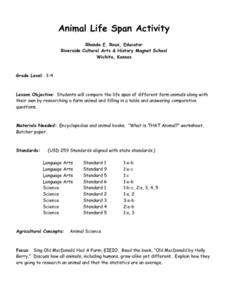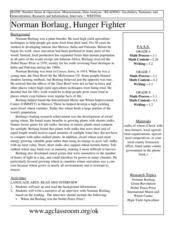Curated OER
Missouri Rice Farming
Sixth graders investigate rice farming in Missouri. In this percentages lesson plan, 6th graders determine how much rice production has increased over time. Students find this number in percentages. Students then figure the percent of...
Curated OER
Agriculture and Me
Second graders categorize and organize agricultural products. In this agriculture lesson, 2nd graders complete classroom activities that challenge them to make connections between agricultural products and their own lives.
Curated OER
Where is Agriculture?
Students explore agriculture. In this agriculture instructional activity, students read "Where is Agriculture?" and discuss all the things that come from agriculture. Students discuss what they need to survive and give examples of...
Curated OER
The Shapes of Rice
Students investigate geometry by identifying shapes related to rice and rice farming. For this geometry lesson, students discuss the different shapes used in rice agriculture and discuss what other objects in our lives use that...
Curated OER
How Much is Dirt Worth?
Dirt is worthless, isn't it? Find out the true value of dirt, and by dirt I mean soil. The class explores what makes soil, the types of soil, and what happens when soil becomes void of its nutrients. There are several great activities,...
Curated OER
Task: Grain Storage
Farming is full of mathematics, and it provides numerous real-world examples for young mathematicians to study. Here, we look at a cylinder-shaped storage silo that has one flat side. Given certain dimensions, students need to determine...
Curated OER
Plate and Planet
Students investigate the health hazards of modern agriculture and how we can choose better food options. In this healthy eating lesson, students identify different indigenous people in photographs and discuss what they might eat....
Curated OER
The Ogre Bully Lesson
Students investigate bullies, agriculture and cooking by completing worksheets about a book they read. In this story analysis lesson, students read the story The Ogre Bully, and discuss bullying as well as farming with their...
Curated OER
What Is On Your Plate?
Students investigate the type of foods that are grown in Alaska. The introduction gives the justification, facts, and statistics to be shared with students. They draw and chart the many different types of food that can be eaten in one...
Curated OER
"Comprehension of Word Problems" Using a Table
Sixth graders practice solving math problems by utilizing a data table. In this number sense activity, 6th graders create a table using the numerical information about a fictitious farm's inventory. Students complete the empty segments...
Curated OER
Wheat: From Field to Oven
How does wheat go from the seed to the table? While focusing on main ideas and supporting statements, class members read an excerpt about wheat production and complete a worksheet. The end goal is a display that shows the different...
Curated OER
Animal Life Span Activity
Students study and compare the life span of farm animals with their own. They research a farm animal, complete a table and answer comparative questions. They work in jigsaw format groups.
Roy Rosenzweig Center for History and New Media
American Indians and their Environment
People could take a page in ingenuity and survival from the Powhatans. Deer skins became clothes, and the members of the Native American group farmed the rich Virginia soil and hunted in its forests for food. Using images of artifacts...
Curated OER
An Egg is Quiet
Students discover information about animal eggs by reading the book, An Egg is Quiet. In this animal science lesson, students research different animals to find out what their eggs look like. Students use a provided chart to...
Curated OER
EGG MAZE: COUNTING BY TWOS, THREES AND FIVES
Students successfully count by twos, threes and fives, using pictures of eggs and poultry as points of interest. They orally review the types of counting (twos, threes, or fives). Students are introduced the idea of a dozen eggs.
Curated OER
Recycle, Reduce, Reuse and Save a Tree
Students examine how to save and protect trees. In this conservation instructional activity, students read books about the usefulness of trees, write ideas in their journals about how trees can be used, and make a book of ways to...
Curated OER
Are You Thirsty? The Effects of Pollution on Drinking Water
Discuss the availability of clean, plentiful water and the causes of water pollution. In groups, sixth graders discuss problem-solving methods for keeping water clean. They explore the function of water treatment plants and perform...
Curated OER
Preparing for Drought
Middle schoolers study droughts in Oklahoma and list possible reasons for droughts. They form subcommittees to explore the drought problem and create plans for drought management and relief. They research five areas around the world...
Curated OER
Norman Borlaug, Hunger Fighter
Middle schoolers study Norman Borlaug. In this reading and math lesson plan, students research Norman Borlaug's work and write a narrative interview with Borlaug. Middle schoolers complete a variety of activities using wheat...
Curated OER
Influence of Geography on the Migration of Virginians
Sixth graders study how geography influenced the westward migration of Virginians. They review the settlement patterns of early Virginians before discussing reasons why people move away from an area. Looking at maps, they determine how...





